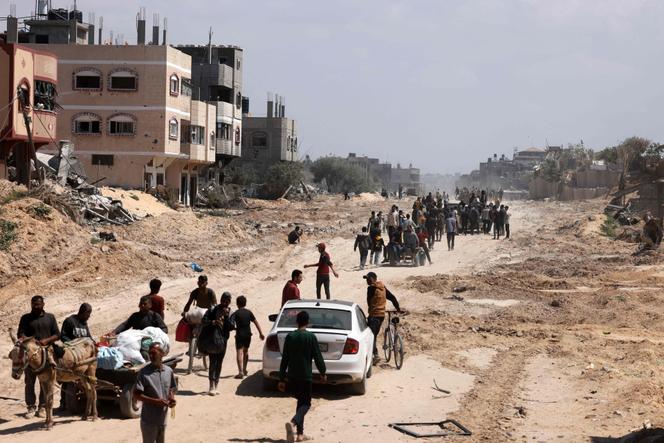


Israel on Sunday, April 7 said it pulled all its troops out of southern Gaza, including from the city of Khan Yunis, six months after the war started. But the military said a "significant force" will continue to operate in the rest of the besieged Gaza Strip. "The 98th commando division has concluded its mission in Khan Yunis," the army said in a statement to Agence France-Presse (AFP). "A significant force led by the 162nd division and the Nahal brigade continues to operate in the Gaza Strip and will preserve the IDF's freedom of action," the statement added.
The Israeli newspaper Haaretz said the withdrawal was tactical and the IDF denied it was the result of a US demand to Prime Minister Benjamin Netanyahu. An army official told the Israeli daily that "there's no need for us to remain in the sector without an [operational] need". "The 98th division dismantled Hamas's Khan Yunis brigades and killed thousands of its members. We did everything we could there." Displaced Palestinians from Khan Yunis may now be able to return to their homes after sheltering in the far southern city of Rafah, Haaretz reported the official as saying. However, the army "will continue to operate there according to the operational needs," the official told Haaretz.
Once densely populated, Khan Yunis has been the scene of fierce fighting for months, with relentless bombardment reducing swathes of the city to rubble. Despite an international outcry, the Israeli government has vowed to carry out a ground offensive in and around neighboring Rafah where more than 1.5 million Gazans have sought refuge.
"We are one step away from victory," Netanyahu said on Sunday speaking at a cabinet meeting. "But the price we paid is painful and heartbreaking." Speaking as truce talks were expected to resume in Cairo with international mediators, he said: "There will be no ceasefire without the return of hostages. It just won't happen." He stressed that "Israel is ready for a deal, Israel is not ready to surrender".
"Instead of international pressure being directed at Israel, which only causes Hamas to harden its positions, the pressure of the international community should be directed against Hamas. This will advance the release of the hostages."
Israel has faced a storm of international outrage over the killing of seven aid workers of the US-based food charity World Central Kitchen in a Gaza air strike on April 1. US President Joe Biden in a phone call with Netanyahu on Thursday demanded an "immediate ceasefire" and hinted at making US support for Israel conditional on curtailing the killing of civilians and improving humanitarian conditions.
Netanyahu meanwhile accused Iran of being behind several attacks against Israel "through its proxies". "Anyone who hurts us or plans to hurt us – we will hurt him. We put this principle into practice, all the time and in recent days," Netanyahu added.
Fears that the war in Gaza could spread have intensified after Iran vowed to hit back for the killing of seven of its Revolutionary Guards in an air strike Monday on the consular annex of its embassy in Damascus. Iran's leaders have pledged retaliation, and the leader of Lebanon's Iran-backed Hezbollah movement, Hassan Nasrallah, has called the consulate strike a "turning point".
The war in Gaza was sparked by the Hamas attack on October 7 that resulted in the deaths of 1,170 Israelis and foreigners, most of them civilians, according to an AFP tally based on official Israeli figures. At least 33,175 people have been killed in the Palestinian territory in Israel's campaign of retaliation, according to Gaza's Hamas-run health ministry.
